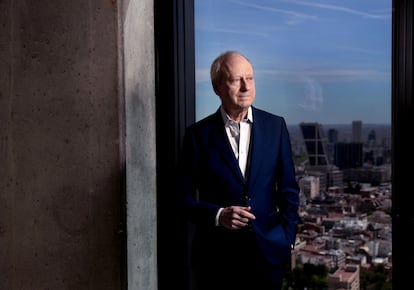Michael J. Sandel, philosopher: ‘The left needs to offer a positive take on patriotism’
The American thinker, author of the acclaimed book ‘The Tyranny of Merit,’ says that progressives need to better articulate a sense of community around issues such as universal health care and income inequality

Almost 30 years ago, Harvard professor Michael J. Sandel scratched through the golden surface of the 1990s. Just beneath that layer of prosperity and euphoria that followed the end of the Cold War, he found a buzz of anxiety. He could hear that many people were rejecting the project of globalization, which was pushed by the elites. The professor collected this discomfort in Democracy’s Discontent (1996), which soon became a classic. Now, when we look back at it, we can see that it had premonitory overtones.
Today, Sandel — who was born in Minneapolis in 1953 — is the closest thing to a rock star in the world of philosophy. His talks fill theaters and his ideas on how to resolve the uncomfortable coexistence between capitalism and democracy are at the center of the debate in which Western social democracy is immersed. From U.S. President Joe Biden to German Chancellor Olaf Scholz, Sandel has had an impact. Scholz went so far as citing The Tyranny of Merit — Sandel’s acclaimed 2020 book — during his campaign in the 2021 German federal elections. In the essay, the philosopher dismantles the theory of meritocracy, pointing out the lack of equality of conditions among citizens, which hinders a truly merit-based system.
After addressing the poisonous culture of merit — which sowed legitimate resentment with disastrous consequences in the working classes — Sandel has now revised his 1996 book, updating it nearly 30 years later to include the explosion in democratic discontent that he once wrote about.
The interview with Sandel takes place at the IE Business School’s skyscraper in Madrid, where he has been invited to offer students one of his famous lectures on justice. It’s quite the experience to see, in real-time, how Sandel generates passionate civic debate between students — the kind of debates that he wants the whole of society to have.
While contemplating the overwhelming views of the city from the 29th floor, the philosopher and the EL PAÍS journalist recall their last meeting, in the drab basement of the Carpenter Center for Visual Arts at Harvard University. That strange interview — which took place three years ago, with six feet of social distance and both men wearing masks — conjured up a dystopian reality that, today, seems far away. Sandel has weaved the pandemic into his story, which involves war, climate change and all the other issues that have caused deep disappointment and weighed down on public life in the West.
To escape this state of malaise, the thinker has two uncomfortable messages for the confused left: first, reconfigure the economy, to make it susceptible to democratic control; and secondly, embrace patriotism. But not the patriotism that the populist right has built on, with walls and fear. He advocates for another kind of patriotism, one that articulates a feeling of community around concepts such as universal healthcare or tax fairness.
Question. You write that, 30 years ago, the notion of democratic discontent was more of a murmur… but today, it’s a loud and shrill sound. What happened?
Answer. During the 1990s, there was confidence — even some arrogance — on the part of politicians and economists. They felt that the American version of democratic capitalism had won. And that, consequently, the main political questions left were merely of a technocratic nature. The neoliberal version of globalization — which included outsourcing jobs to low-wage countries and deregulating the financial industry — was embraced, in the name of economic efficiency. What these people missed was the effect such a project would have on working-class communities, as well as the growing income inequality it would produce.
Q. You warn that many of the people who voted for Trump — and other populist right-wing options in other parts of the world — did so because they agreed with certain xenophobic ideas. However, you link another part of the support to legitimate complaints — built over the course of four decades — about neoliberal governments. Where do those grievances stand today, when we may find ourselves facing a second round of Trump versus Biden?
A. Those grievances are basically the same as when Trump left office, which is why most Republican voters accept the big lie that the 2020 presidential election was stolen. A good part of working-class people sees the left as more aligned with the values and interests of the well-educated professional classes. These grievances persist, unfortunately, because the progressive side has yet to find an alternative response to those complaints. Right-wing populism is, historically, a symptom of the failure of progressive politics.
Q. But we’ve seen clear progressive policies from the White House over the past two years, no?
A. You have to give credit to Biden, whose administration has done more than anyone expected to begin to break away from the neoliberal version of globalization. For example, it has not promoted free trade agreements. The first Democratic candidate in 36 years without a degree from an Ivy League university, [Biden] was less stuck to belief in meritocracy than his predecessors. And he’s a bit more skeptical about the economists who have advised previous Democratic and Republican administrations.
Q. Why does the populist right continue to connect more with the working-class?
A. In part, the answer is that politics is not just about redistributive issues… it’s also connected to a sense of patriotism. People need a strong sense of identity and community. And the left has failed to offer its own positive version of patriotism as an alternative to the narrow, bigoted and xenophobic hypernationalism offered by the populist right.
In the first edition of Democracy’s Discontent, I expressed my concern that people feel that the moral fabric of community is unravelling around them… in families and neighborhoods, but also at the national level. Globalization — or, at least, market-led globalization — ignored the meaning of national community. And that’s something that progressives just haven’t found a way to address. For the right — for Trump — the border and immigration are a way of appealing to the desire for a national identity. The left wants another approach to immigration, but it also needs to offer an alternative idea about what holds us together as a country, as a community, as a nation.
Q. How do we build that other healthy version of patriotism that you advocate for?
A. We could start by asking what we owe each other as fellow citizens. The healthcare debate, at its best, is a debate about mutual obligations between citizens. If you notice, Obama’s healthcare reform [the Affordable Care Act, 2010] was mainly proposed with technocratic arguments: that it was more efficient than the system that existed, and so on and so forth. But the underlying feeling about national community has not yet been articulated. It’s a moral and civic debate… it’s not about technocratic efficiency.
Healthcare is just one example. It’s also important for the national community to decide whether companies can move to other jurisdictions to pay less tax. [When a company] avoids higher tax rates by moving operations from one country to another with lower rates, that’s not just a glitch… it’s a patriotism problem.
Q. Is the left afraid to talk about patriotism?
A. Yes. Because of fear. There’s almost an allergy towards the word. Patriotism — as a political argument — has been ceded to the right. This is a big mistake. The right has exploited it very effectively.
Q. When we last spoke, almost three years ago, I had hopes that the pandemic would help make inequalities more visible. It revealed the extent to which we depend on workers that — in meritocratic logic — we had previously looked down on. We even started calling these people “essential workers.” Have you seen a change in how we value the dignity of work?
A. I fear that, as some time has passed, there hasn’t been serious reflection on essential workers, on how to recognize their contributions and pay them fairly.
Q. Another thing that the pandemic revealed was the importance of effective governance. Has this notion also been forgotten?
A. I don’t think we’ve forgotten the importance of the state. Austerity measures — once embraced by many countries — have been rejected. [During the pandemic], governments carried out large-scale spending that would have been inconceivable in the years after the 2008 crash. Politics has also been affected: the era of globalization taught us that there is no alternative to blind faith in the market… it was a subject that was not open to democratic debate. But the financial crisis and growing inequalities were the product of deliberate political decisions that could have been different. [Perceptions about] this kind of politics have also changed.

Q. We are now facing the great challenge that all societies must think about together: the fight against the climate crisis. How do we achieve a green transition without repeating the mistakes of past political projects — without once again widening the gap between winners and losers?
A. How we deal with climate change will be the most important test. There is a tendency to face climate change as a technocratic problem, to correctly input economic incentives [for green energy and technology], etc. But [the climate crisis] is more than a technological or economic problem. Fundamentally, it is a political question. We need bottom-up climate policy… not abstract blueprints or technocratic solutions.
We need to start by having conversations, especially with people in communities where lives and jobs depend on fossil fuels. This will require political leadership and activism. The reason for the resistance to policies that could lead to a green economy is that there is deep skepticism on the part of working people. Thousands of jobs were lost in vast industrial areas in the name of economic globalization. These people were told: there will be losers, yes, but the gains of the winners will offset the losses of the losers. That worked in theory, but not in practice. Now, these same communities wonder, “will the same thing happen again?” It’s a legitimate question.
Q. In a conversation with Yuval Noah Harari, you said that the climate change debate isn’t about facts or education.
A. It tends to be said that the reason for the opposition to the green transition is that [the people who oppose it] don’t know enough about science. But it’s not about science, nor is it about education. This isn’t about lecturing people about the dangers of global warming… it’s about trust. It’s a political issue and, as such, requires a genuine kind of grassroots civic engagement and discussion.
Q. How do politicians find a middle ground between technocracy and the people’s demands?
A. Politicians and parties should broaden the terms of political conversation to include issues like the ones we’re discussing. But it’s unrealistic to expect them to do it on their own. We have to understand that the broadest type of public conversation can only come from within civil society.
Q. Is social media a suitable forum for this kind of conversation?
A. We need to challenge the way social media works. We need to create platforms for public conversation that don’t simply accept the ad-driven business model of tech companies. A business model that depends on keeping people online as long as possible — so that they can collect more and more personal data to sell [users] things that reinforce that cycle of consumerism — is antithetical to the kind of public conversation we need. It’s urgent that we cultivate the lost art of democratic public conversation.
Q. At the moment, what are the principal differences between the center-left and the more radical left?
A. I think that the relationship between center-left parties [and groups] and those from the more populist left is in the process of being redefined.
Q. Where should they start?
A. The most powerful combination to rejuvenate the center-left is to connect ostensibly conservative values — such as patriotism and shared identity — with a reconfiguring of the economy to make it amenable to democratic control… something traditionally associated with the populist left. Powerful notions of community — which seem to drink from conservative thought — and economic power controlled by the citizenry are two ideas [that are central to] the future project of progressive politics.
Q. How does the war in Ukraine fit into your thinking?
A. I think that the war in Ukraine is the most dramatic example of the nonsense of neoliberal globalization. A central idea of liberal globalism was that commercial ties would make war obsolete. Although it goes back to Montesquieu, who spoke of doux commerce: the more nations and people trade with one another, the less likely they are to fight one another, because trade ties will give them a vested interest in peace. We heard this over and over again in the 1990s and early 2000s, as an argument for admitting China into the WTO, for example. In Germany, such an argument [made the case] for developing an energy dependency on Russia. Evidently, this has not been the case. Ukraine is a reminder that politics and national borders will not disappear. We must develop trading patterns with some sense of who reliable partners are, [instead of] just being driven by the pursuit of supposed “efficiency.”
That’s another idea that I think the Ukrainian war has made us think about… the idea that the economy is not autonomous. It is not simply a fact of nature. It is, inevitably, a political issue that should be the subject of democratic political debate.
Sign up for our weekly newsletter to get more English-language news coverage from EL PAÍS USA Edition
Tu suscripción se está usando en otro dispositivo
¿Quieres añadir otro usuario a tu suscripción?
Si continúas leyendo en este dispositivo, no se podrá leer en el otro.
FlechaTu suscripción se está usando en otro dispositivo y solo puedes acceder a EL PAÍS desde un dispositivo a la vez.
Si quieres compartir tu cuenta, cambia tu suscripción a la modalidad Premium, así podrás añadir otro usuario. Cada uno accederá con su propia cuenta de email, lo que os permitirá personalizar vuestra experiencia en EL PAÍS.
¿Tienes una suscripción de empresa? Accede aquí para contratar más cuentas.
En el caso de no saber quién está usando tu cuenta, te recomendamos cambiar tu contraseña aquí.
Si decides continuar compartiendo tu cuenta, este mensaje se mostrará en tu dispositivo y en el de la otra persona que está usando tu cuenta de forma indefinida, afectando a tu experiencia de lectura. Puedes consultar aquí los términos y condiciones de la suscripción digital.









































